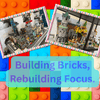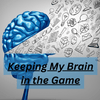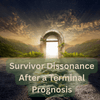End of My Fifth Cycle of Chemo... a Mixed Bag of Emotions
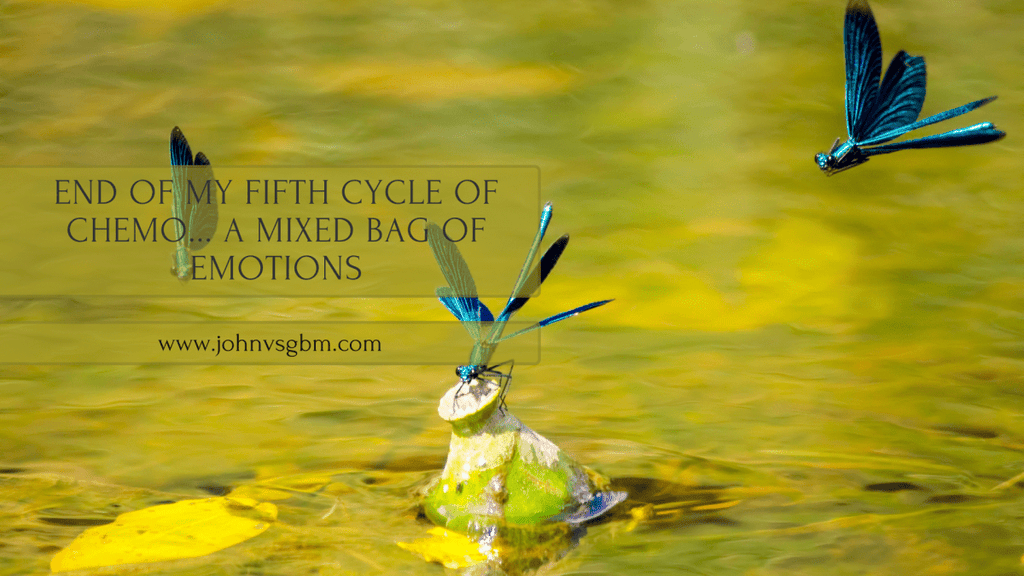
End of My Fifth Cycle of Chemo... a Mixed Bag of Emotions
End of My Fifth Cycle of Chemo... a Mixed Bag of Emotions
I have finally finished my fifth cycle of Temozolomide (Temodal), the chemotherapy treatment commonly used for Glioblastoma patients. This journey began after I was diagnosed with Glioblastoma on November 28, 2023, and underwent a full surgical resection the very next day, November 29. It was an intense and surreal time. After healing from the surgery, I started a six-week regimen of 30 fractions of radiation therapy, with daily sessions Monday through Friday. During this same time, I also took Temozolomide for 42 consecutive days, starting what would become an emotionally and physically draining routine.
Understanding the Glioblastoma Protocol
During my concurrent radiation and chemotherapy, I also underwent weekly blood tests to monitor toxicity and overall health. The dose of Temozolomide during the radiation phase was relatively low. Once that phase was completed, I moved into six high-dose cycles of chemotherapy. Each cycle involved five days on, and 21 days off. But here's the kicker: the dosage was quadrupled compared to the radiation phase. Just when you think you're done, they crank it up. Currently, I am at the end of cycle five, meaning one more to go, barring any complications or signs of tumor growth.
Throughout this, I have also been using the Optune device. For those who are unfamiliar, Optune is a wearable treatment that delivers tumor-treating electric fields directly to the brain using four adhesive arrays. It’s FDA-approved and has shown to improve survival when combined with chemo. I wear mine 18 hours a day—every day—and will continue for at least 18 months. It is a strange, buzzing, warm presence I have grown accustomed to. Between Optune and chemotherapy, I often feel like I am waging a full-time war inside my body, even when everything outside looks calm.
Mixed Emotions as Chemo Nears the End
The emotional part of Glioblastoma treatment doesn’t get talked about enough. Everyone talks about the pain, the nausea, the vomiting—but not everyone talks about the anxiety of finishing treatment. Yes, you read that right—finishing. You’d think I’d be celebrating. And part of me is. But there’s another part that is terrified. Terrified that when chemo ends, the cancer will come roaring back. Terrified that somehow, the structure and routine of treatment is what has been keeping it away. Without it, I feel exposed.
To be fair, my physical side effects from Temozolomide have been manageable. I dreaded chemo at first, convinced I’d be vomiting every night. I’ve only been truly nauseated once, and it was my fault—I forgot my anti-nausea meds. The true beast for me has been fatigue. I don’t mean tired like you need a nap. I mean bone-deep exhaustion that makes getting dressed feel like running a marathon. This exhaustion is constant, and while it comes in waves, it always returns. It’s a fatigue that never fully lifts.
Living with Glioblastoma is More Than a Medical Condition
Glioblastoma doesn’t just affect your health—it redefines your entire life. Your plans, your emotions, your relationships. Suddenly everything revolves around treatment, scans, blood work, nutrition, and devices strapped to your body. And when the active part of treatment slows down, when you near the end of chemo, it’s hard to know what to do. Do you relax? Or do you live in constant dread of the next MRI?
I want to give myself permission to rest. To say, “You did the hard thing. Now breathe.” But instead, I feel an invisible weight pushing down on me, reminding me that Glioblastoma doesn’t go away. It just hides, waiting. And I hate that feeling. I hate how it’s stolen my peace of mind, even on days when my scans are clear.
Finding Spiritual Comfort Through Uncertainty
So, what do I do? I pray. A lot. And I talk. Not just to my husband or my family, but to the universe. To whatever higher power is out there. Before my diagnosis, I wasn’t particularly religious. I used to cringe when someone brought up God or faith. But now, I understand that spirituality doesn’t have to mean organized religion. It can be whatever brings you comfort. For me, that’s been the idea of a god—not necessarily the God I was taught about, but something bigger than me. Something watching. Something listening.
Faith has given me peace. Not always, but often enough to keep me grounded. It helps me put one foot in front of the other when I am too tired to move. It helps me cry without feeling broken. It helps me remember that while Glioblastoma is part of my story, it’s not the whole story. I am still here. I am still writing.
What Comes After the Sixth Cycle?
That’s the big question, right? What happens when the chemo ends? I will still wear the Optune. I’ll still get MRIs every three months. I’ll still be part of a clinical support network. But will I feel safe? Probably not. Will I feel brave? Maybe. What I will feel, I suspect, is grateful. Grateful that I made it through five cycles. Grateful for each day, each moment, even if that moment is filled with fear.
I’ve also started preparing emotionally for that post-chemo chapter. I’ve thought about getting a tattoo, journaling more often, doing something symbolic that honors what I’ve endured. I want to look back at this period not as just pain, but as proof that I kept going. Because if Glioblastoma teaches you anything, it’s how to keep going—even when it hurts, even when it’s scary, even when you have no idea what the future holds.
Final Thoughts
I wanted to end this post not with despair, but with hope. Yes, Glioblastoma is terrifying. Yes, it feels like a monster that lurks in your brain and shadow. But it also shows you how loved you are. It shows you how strong your circle is. And it shows you just how much strength you already had inside.
To anyone reading this who is also nearing the end of treatment—whether chemo, radiation, or even the start of hospice—I see you. I understand the fear, the bittersweet relief, the cautious hope. Just know you’re not alone. Not ever. Keep fighting. Keep hoping. Keep telling your story. It matters more than you know.
Helpful Resources
- Learn more about Optune Therapy
- American Brain Tumor Association
- More Glioblastoma Stories at JohnVsGBM
Tags: Glioblastoma, Temozolomide, Optune, Brain Cancer, Chemo Cycle, Fatigue, Faith and Cancer, JohnVsGBM
Disclaimer: This blog is based on personal experience with Glioblastoma treatment. It is not a substitute for professional medical advice. Always consult your care team before making changes to your treatment plan. If you are in emotional distress, please call or text 988 for support.

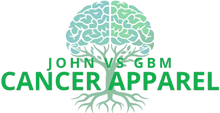
 NEW ARRIVALS
NEW ARRIVALS APPAREL
APPAREL GIFT AND HOME
GIFT AND HOME COLLECTION'S
COLLECTION'S HOPE HUB
HOPE HUB BLOG
BLOG